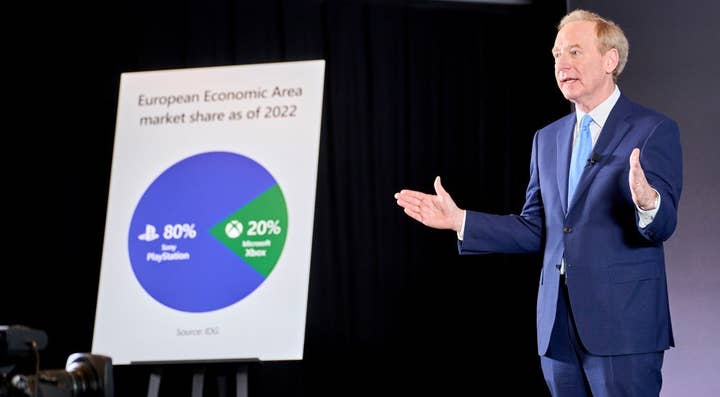Microsoft: "This is the darkest day in our four decades in Britain"
Microsoft president Brad Smith expresses shock after its bid to buy Activision Blizzard is blocked, and calls on the UK Prime Minister to "look hard" at the CMA
Microsoft President Brad Smith has heavily criticised the UK regulator and says that the decision to block its Activision Blizzard acquisition will discourage innovation and investment in the country.
Speaking during the BBC's Wake Up To Money, Smith stopped short of saying Microsoft would cut investment in the UK, but admitted that the company's confidence is shaken. Microsoft is a major business that operates in the UK, and in terms of video games, it operates a number of UK studios, including Rare, Playground Games and Ninja Theory.
"I think it's bad for Britain," Smith said. "The business community, the investment community and the technology sector around the world have been following this case. And the strong message that the CMA has sent, is not just to surprise everyone who fully expected this acquisition to be approved, but to send a message that will discourage innovation and investment in the United Kingdom. And I think in that sense the impact of this decision is far broader than on Microsoft or this acquisition alone."
He added: "Microsoft has been in the United Kingdom for 40 years and we play a vital role, not just supporting businesses and non-profits but even defending the nation from cyber-security threats. But this decision, I have to say, is probably the darkest day in our four decades in Britain. It does more than shake our confidence in the future of the opportunity to grow a technology business in Britain than we've ever confronted before."
Smith reiterated that the decision, in his view, was based on a 'flawed understanding' of cloud streaming, and believed the firm's offer to allow other services to stream its games as a more than adequate solution to the regulator's concerns.
"It's all about a potential concern about what could become the cloud streaming of games, like you see the streaming of movies on a network like Netflix," he added. "But this business is so small today, that Microsoft can't even stream games to more than 5,000 people at a time in the entirety of the United Kingdom. So for regulators to step in and seek to torpedo a $68 billion global traction out of a concern of a part of the business that is so small, and to reject so may proposals to try and address their concern, it leaves people worried and it leaves people thinking that, actually, the process in Brussels worked far better than what we are now address in London."
Smith repeated that Microsoft believes that Europe is now a friendlier place to operate a tech business, although the EU is also adopting a strong regulatory stance on digital and tech. It also has yet to approve the proposed acquisition of Activision Blizzard.
"I am optimistic that the European Commission will continue to go forward, as it has signalled in recent weeks and months, that it will regard the very promises that the CMA has rejected as far more appropriate," he stated. "It is all about being pragmatic. Don't we want regulators to be pragmatic? Don't we want regulators to actually talk to the people they're regulating? Don't we want regulators to look for solutions rather than reasons to block people moving forward."
Indeed, Smith was particularly critical of the CMA process, and suggested that Europe's approach as far more reasonable.
"We have regulators who are not only unelected and unaccountable and now making decisions that are fundamentally unwise"
"We thought we had answered every question that the CMA panel had put to us. And we specifically said 'if you have any other questions or concerns, please let us know. We want to address them.' But they went silent. We heard nothing from them. This is not the way regulators in Brussels work with companies, you have more of a conversation.
"Investments flow to places where people have confidence in the way laws and regulations work, and for all of us who had some hope that post-Brexit the UK would construct a constructor that would be more flexible, better for investment, better for technology, we're finding the opposite is true."
He added: "What is most striking to me is that the English Channel has never seemed wider in terms of Europe as a continent being attractive to investment [and] Brussels being a place where one can sit down and have a conversation with the regulators who are accountable to the elected leaders. And the difference we now confront in London, where we have regulators who are not only unelected and unaccountable and now making decisions that are fundamentally unwise."
In a message to the prime minister, he added: "If the Government of the United Kingdom wants to bring in investment, if it wants to create jobs, and if it wants to make the United Kingdom a home where technology is not only going to flourish, but be creative… then it needs to look hard at the role of the CMA, this regulatory structure in the United Kingdom, this transaction and the message that the United Kingdom has just sent to the world. Because I can tell you, while I might have a point-of-view that is based in part on an interest our company has, I have heard from a great many around the world. People are shocked, people are disappointed and people's confidence in technology in the United Kingdom has been severely shaken."
Ultimately, Smith says, people may be reluctant to start companies in the UK if they feel the UK regulator would block their efforts to sell or merge their companies, if and when the time comes.
"There's a clear message here: The European Union is a more attractive place to start a business if you want someday to sell it, than in the United Kingdom."

